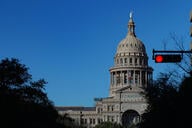You have /5 articles left.
Sign up for a free account or log in.
Eric Hedin, the associate professor of astronomy and physics at Ball State University who was investigated in 2014 for allegedly teaching intelligent design, has earned tenure. That’s despite claims that he was proselytizing in a science class and the university’s strong affirmation of the scientific consensus around evolution in light of the allegations.
Hedin declined comment on the promotion, and a university spokesperson did not immediately respond to questions about how, if at all, past concerns about Hedin’s teaching were resolved.
In 2013, Ball State said it would investigate Hedin, then an assistant professor, after it received a letter from the Freedom From Religion Foundation accusing him of crossing the line from teaching science to teaching Christianity. The foundation said it had received reports that Hedin was pushing his personal religious views in a course called Boundaries of Science, and that its partial syllabus included works by intelligent design proponents and other “Christian apologists who lack any scientific credentials whatsoever,” such as C. S. Lewis.
The foundation said it did not object to the premise of the honors science seminar, described in the syllabus as an investigation of “physical reality and the boundaries of science for any hidden wisdom within this reality which may illuminate the central questions of the purpose of our existence and the meaning of life.” Rather, the organization said it objected to the course “as taught,” based on reports that Hedin was proselytizing and endorsing a Christian viewpoint over others presented. As a public university, Ball State could be in violation of its obligation to separate church and state, the foundation said.
Later that year, the foundation again criticized the university for hiring Guillermo Gonzalez, another assistant professor of physics and astronomy who had written a book in support of intelligent design. President Jo Ann Gora soon released a statement against creationism in the science classroom.
“Intelligent design is overwhelmingly deemed by the scientific community as a religious belief and not a scientific theory,” and the question was not one of academic freedom, but one of academic integrity, she said. “To allow intelligent design to be presented to science students as a valid scientific theory would violate the academic integrity of the course as it would fail to accurately represent the consensus of science scholars.”
Gonzalez, for his part, said he had never taught intelligent design and would not teach it. But Hedin has limited his public comments, and it remains unclear exactly what he was teaching, and how. In a rare interview with Indianapolis Monthly in 2014, Hedin said that while he was a Christian, he was far from a culture warrior and only attempted to engage students in science by tackling some of its biggest questions, such as the rise of consciousness.
“It was an awful shock,” Hedin told the magazine. “How do you feel when you’re falsely accused?”
Hedin’s department chair, Thomas Robertson, also supported him at the time, saying the course syllabus was approved by a departmental committee and professors are regularly evaluated.
Yet critics, including Jerry Coyne, a professor of ecology and evolution at the University of Chicago who runs the blog Why Evolution Is True, still questioned Hedin. Coyne wrote on his blog that the Boundaries syllabus was “little more than a course in accommodationism and Christian religion, with very little science. It’s my firm opinion that teaching this course at a state university not only violates the First Amendment, but cheats the students by subjecting them to religious proselytizing when they’re trying to learn science.”
For example, Coyne noted, one course objective was to study “implications relating to the significance and value of human life, and as possible indications of the nature and existence of God.” Coyne asked why a science course is looking for indications of the existence of God, intelligent design and “miracles and spirituality.”
Yet some have accused Coyne and like-minded critics of policing academic discussions. The Discovery Institute, a pro-intelligent design think tank, has argued that limiting what professors can say in the classroom to the majority view is an “academic straitjacket." Others have said they don’t necessarily agree with Hedin’s views or intelligent design, or their place in the classroom, but they do believe a professor shouldn't be severely punished for teaching them.
Adam Laats, a professor of education at the State University of New York at Binghamton who studies cultural conflicts in the classroom, has previously criticized Coyne as ignoring the broader implications for academic freedom in his critiques of Hedin and Emerson T. McMullen, a professor of history at Georgia Southern University who also has been accused of proselytizing. Calls for universities to investigate professors' speech is a slippery slope, he said.
Laats said on Wednesday that the university had no grounds to deny Hedin tenure based only on the “creation of a course that apparently inflates the scientific credentials of intelligent design theory.” He said he also disagreed with Coyne that Hedin’s was a First Amendment case, in that public college and university professors have much less authority over their students than do K-12 instructors.
In short, Laats said, “Defending Hedin’s right to a tenure review based on his effectiveness as a teacher, scholar and collaborative colleague is not about defending the intellectual or scientific legitimacy of intelligent design theory.” Rather, he said, it’s about defending a “much more important principle,” academic freedom.
Coyne said he didn’t think Hedin’s past should preclude him for getting the promotion he otherwise earned, and that getting “called out on the national stage at told to stop” in 2013 was probably punishment enough. Hedin’s research portfolio doesn’t appear to involve any publications on creationism, Coyne added. And “if he does [intelligent design] in his spare time, he has the right to do that — he just can’t do it in the classroom.”
Coyne also said he agreed with Laats that there should be a high bar for university investigations into professors’ classroom practices. But he rejected the notion that his criticisms of Hedin and others threatened academic freedom.
“There has to be a damn good reason to investigate but it seems to me like a violation of the Constitution is a perfectly valid one,” Coyne said. “Teaching creationism in public schools is a violation of the First Amendment.”





